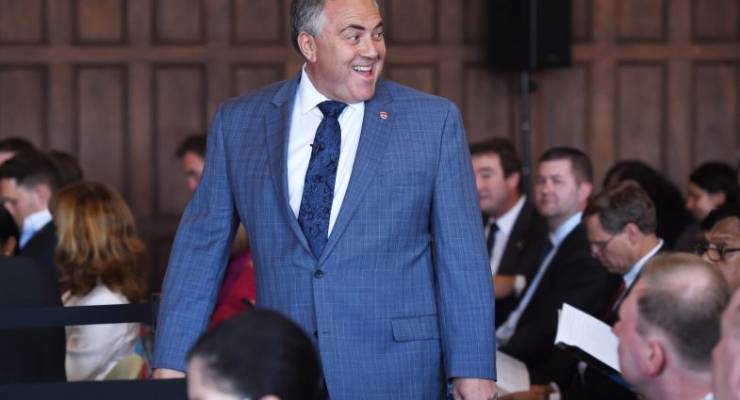
I’m about to do something I can barely recall doing at any time in the last ten years: praise His Excellency Joe Hockey, Australia’s Ambassador to the United States of America. Crikey never stinted in its criticisms of Hockey during his time in politics, and there’s no one who would argue it was a spectacularly successful career. His appointment to succeed Kim Beazley in DC was, correctly, seen as a reward for doing the right thing by Malcolm Turnbull and departing politics gracefully after the events of September 2015.
Unlike, you know, someone else.
2015 was another world. Trump was a presidential candidate but still seen as an amusingly gauche novelty. Hillary Clinton or some mainstream Republican would win in 2016 and essentially represent policy continuity as far as Australia’s economic and security interests went. Hockey, while not as well regarded in Washington as Kim Beazley — who has worn his slavish Americaphilia on his sleeve his whole life, as is a former defence minister as well — would continue the recent tradition of sending retired senior politicians to White Oaks, would have his calls returned in Canberra and is acknowledged even by his political enemies as a nice bloke. Thus, continuity.
As 2016 unfolded, of course, continuity went out the window. Hockey, who started in January that year, had to navigate Australia’s interests with a Republican Party racked by the Trump insurgency and a base in open revolt against the party establishment — exactly the kind of people Hockey would have expected to do business with, and with whom he could best do business. And Hockey went assiduously about his task of cultivating relations with the Trump campaign and Republican figures once he became the nominee, attending the Republican convention while being open how bizarre it all was.

And right from the outset of the Trump administration, Hockey has publicly maintained a positive attitude to it when everyone else has joined in criticising it. At the end of last year, in an extended speech describing Trump’s first year, Hockey predicted he would be re-elected if an election were held now and described the deep mood for change — and discomfort about change — outside America’s cities.
Don’t confuse any of this with Hockey’s personal views about Trump. Whatever personal reservations Hockey, an economic liberal and a family man, has about Trump have been kept firmly under wraps, in favour of his job as ambassador, to ensure Australia’s views are heard both in Congress and the White House, as they were when Trump imposed steel and aluminium tariffs earlier in the year. And Hockey getting the call to go golfing with Trump on April 15 was confirmation of how successful Hockey has been at ingratiating himself with the administration.
It might be that Hockey has finally found a role that suits his talents. He wasn’t brutal enough for the leadership; he’s not known as a policy wonk. But he’s intelligent, genial and practiced at the political arts of deception and ingratiation, so managing a relationship with an unstable and self-contradictory fraud like Trump might be exactly the kind of role Hockey can excel in.








looks like joe`s main talent has done him well again, he`s crawled out of Abbotts backside and straight into trumps, a quick shower and its business as usual.
Why do you assume that he showered?
“so managing a relationship with an unstable and self-contradictory fraud”
Peas in a pod really.
The trouble with Joe is that he thinks he got as far as he did on talent, a burden he shares with much of the extraordinarily entitled.
Upper class twit.
Talk about damning with faint praise Bernard.
So he only insults the poor, not anyone with power and money?
Bernard your last paragraph summed Joe Hockey up beautifully.